Asian Institute of Management Philippines
Students from across the Global Network for Advanced Management traveled to the Philippines to attend AIM's Global Network Week module on sustainable tourism.
Day 5: October 21, 2016
The presentation of capstone projects and awarding ceremony was the focal point of the last day of the Global Network Week, where the students were given the chance to present their marketing plans, strategies, and policy recommendations to selected sites visited during the entire week. A set of panellists was present during the presentation, including Professor Fernando Martin, Y. Roxas, John Paolo R. Rivera, Ofelia Odilao-Bisnar, and Afrecita D. Nieva.
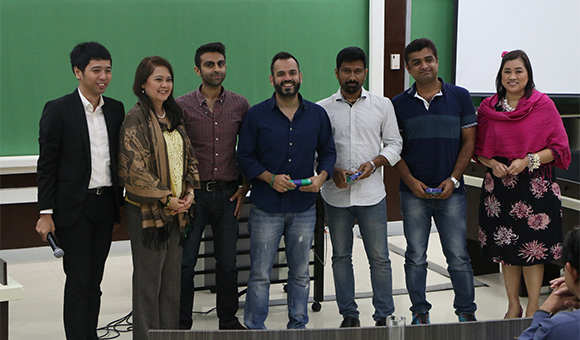
The first group presented a marketing plan for the ECHOstore. The group started off by presenting a SWOT analysis of the existing business strategy utilized by the store, which was followed by recommendations where a need to further strengthen the existing marketing campaigns of the store was emphasized. According to the group, international certifications and digital marketing should be at the core of its strategy.
The Masungi Georeserve was the topic that was chosen by the second group, where another marketing strategy was presented. Just like the first group, a SWOT analysis was made to contextualize the marketing strategy that they proposed. A list of recommendations to improve its marketing plans was provided, including a customer-focus strategy and the inclusion of night-stay and membership packages.
The last group decided to focus its presentation on the marketing strategy of the DVF dairy farm. According to the group, the desire of the owner to expand its production and sales must be complemented by a strategic marketing plan whereby engagement with more dairy farmers and slight changes in the products’ images may be done. The group also highlighted the possibility of working with the Philippine Carabao Center in furthering its marketing interests.
At the end of the ceremony, each of the students was given a certificate signifying his or her successful completion of the course.
Day 4: October 20, 2016
The students of the Global Network for Advanced Management traveled to the Masungi Georeserve on the third day of the Global Network Week (GNW). Anne Dumaliang, project manager of the Masungi Georeserve, provided an introductory lecture on geotourism and the Masungi Georeserve park. As a newly established park last December 2015, Ms. Dumaliang talked about how the park diverges from the usual mass tourism destinations in the country. Masungi Georesrerve’s operations revolve around three main tenets of protection, Geotourism education, and community development. Using a holistic approach, the park highlights its unique sense of place, where protection and community involve can complement each other.
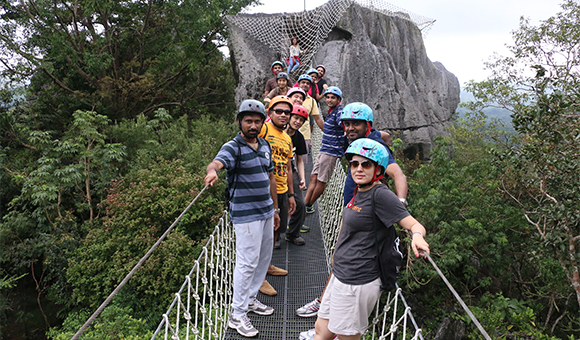
Following the lecture, the students were provided a short briefing before embarking on the four-hour trail at the park. The students were able to explore the 350 unique flaura and fauna found in the park. Dumaliang joined the students for the duration of the trail, providing insights and facts along the way.
The students enjoyed the scenic view atop the park’s hiking spots such as the human-sized web, Sapot, and the famous hammock, Duyan, where a view of the Laguna de Bay and the thousand-year-old limestone formations surrounding the park can be seen.
Day 3: October 19, 2016
The students headed to Nueva Ecija early this morning to visit the DVF Dairy Farm, 130 kilometers north of Manila. Chairman and President Danilo V. Fausto led the farm and production tour while answering the students’ questions. For a start, he bought 10 carabaos. Fausto realized the many livelihood opportunities in the countryside of Talavera, Nueva Ecija. Seeing the untapped potential of carabao raising, he was convinced that farmers could double their income through dairy farming by lending them carabao stocks, yielding their milk, and then selling it to DVF Farm to be processed as dairy products. “In the past Filipino farmers get PHP 4,200 per month or PHP 55,000 income per year. We were able to improve their earnings to PHP 11,700 per month, and they get it before breakfast, ” said Fausto.
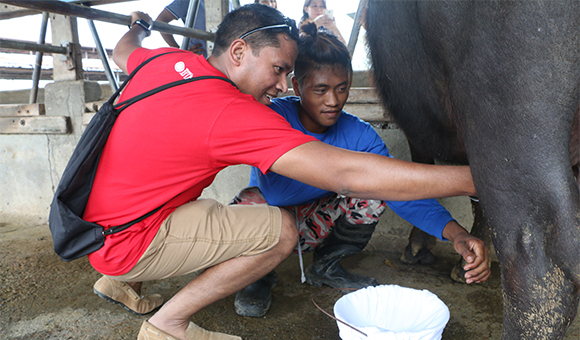
Next, Fausto brought the idea to the farmers to plant and harvest Napier grass, which is healthy food for the lactating carabaos that increases their milk production. Fausto stated, “Rice has been the main produce of the farms in Nueva Ecija. It requires a lot of labor and capital inputs. Planting grass requires little inputs and management compared to rice production. From a little income of PHP 24,000 per hectare, per year through rice planting, now the soil can generate net revenue of PHP 850,000 per hectare, per year through grass planting and converting the grass to milk by feeding them to carabaos.” To help improve the source of income in the Talavera community, DVF Farm employs local technical employees, microbiologists, chemists, and food technologists to make sure that the milk quality meets the safety standards. The employees from the community receive regular training on management and how to improve carabao breeds.
“We are still small and not yet ready for above-the-line marketing. Our PR is only through word of mouth,” Fausto said. “Our main business is still bringing fresh carabao milk in the market. Our plant here in Nueva Ecija is busiest during April, November, and December wherein locals visit to get fresh carabao milk, yogurt, and pastillas during All Soul’s Day because our plant is near the cemetery, and also during Christmas holidays.” Fausto added. Since 1988, DVF Farm has helped hundreds of farmers and dozens of employees improve their quality of life.
In the afternoon, the students went to Munoz, Nueva Ecija, home of the Philippine Carabao Center (PCC). Dr. Annabelle S. Sarabia, chief operations of the center, delivered a lecture on achieving food security and reducing rural-urban income disparities by improving the genetic potential of carabao for milk, meat, and draft. She said PCC’s goal is to develop carabao-based and -related enterprises to increase the income and nutritional status of the farming communities.
“Local production contributes only 1% to the dairy supply, and 99% is imported from New Zealand, Australia, and Europe.” Sarabia said. She mentioned that PCC is now genetically improving Philippine purebred carabaos through artificial insemination and cross breeding. The program involves the participation of local government units, government institutions, small entrepreneurs, and farmers to help improve carabao-based livelihood in the region.
Sarabia said that the challenges of carabao farming include the fact that there is limited space for grazing the cattle, limited forage, and a lengthy reproduction time of one year of gestation. “Farmers’ profitability is also dependent on technical efficiency, meaning how efficient they breed the carabaos. PCC maintain its own farms so that we can maintain genetics of the breed and make improvement through research and development,” she said.
Day 2: October 18, 2016
Sustainable development was the focal point of the discussions held at the Asian Development Bank (ADB). The students were welcomed by Bart Edes, head of the Knowledge Sharing and Services Center (KSSC), who provided a brief introduction about the ADB. The institute’s history, mission, vision, and activities are just a few topics Edes talked about.
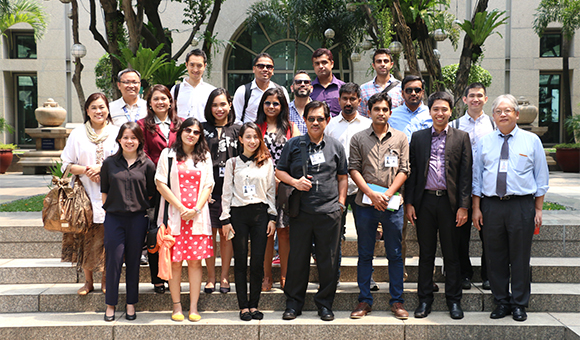
The first discussion was conducted by Dr. Young Uck Kang, knowledge sharing and services specialist, and focused on sustainable development. According to Kang, there exists a unique challenge in achieving Millenium Development Goals (MDGs) and Sustainable Development Goals (SDGs) in every country that requires consideration—bureaucracy, decision-making processes, etc. A vital question therefore is how one can make SDGs and MDGs relevant for the other countries, especially the relatively poor. Kang suggested that the self-realization of countries, from learning through knowledge and experience sharing, is one of the many ways for sustainable development initiatives to accrue.
Complementing the discussion on sustainable development, the second session was dedicated to case study discussion on ADB's Asia Solar Energy Initiative and the Solar Rooftop Project in the Philippines. This was presented by Dr. John Paolo R. Rivera of the AIM-Dr. Andrew L. Tan Center for Tourism, together with the proponents of the aforementioned project, Chatiya Nantham, lead facilities planning and management specialist, and Erwin Casaclang, associate facilities planning and management officer. The case discussion tackled the approaches and business model diagrams used, as well as the issues encountered in implementing the project.
The site tour was facilitated by Erwin Casaclang, who discussed how the institute sustains its ISO certifications, as well as the sustainability measures practised within the institution. Casaclang also provided a tour to complement his discussions. The students were able to visit various sustainable facilities of the institution, such as a rainwater harvesting system, a segregation room, and the solar energy rooftops.
For the afternoon session, the students visited the ECHOstore branch at Salcedo Village, Makati City, and the Great Women Shop at Pasay Road. Through the visit, the students were able to see the products of various local communities around the Philippines. This visit was made to complement Jeannie Javelosa’s discussion yesterday on “3Gs-Good (Echosi Foundation development work) GREEN (ECHOstore) and GENDER (Great Women)” during the first day of the GNW. The students were welcomed by the founders, Javelosa and Pacita Juan.
Day 1: October 17, 2016
Twelve students from IE Business School (Madrid, Spain), Indian Institute of Management (Bangalore, India), and Yale School of Management (New Haven, CT) were welcomed by Professor Noel M. Cortez, gead of the AIM-W. SyCip Graduate School of Business, and Professor Fernando Martin Y. Roxas, executive director of the AIM-Dr. Andrew L. Tan Center for Tourism.
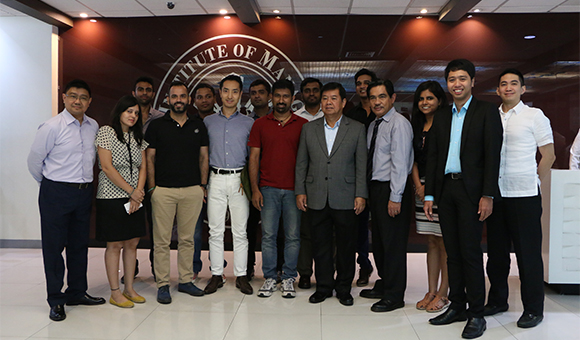
Day one started with an inspirational success story by social entrepreneur Jeannie E. Javelosa, co-founder and director of ECHOstore Sustainable Lifestyle, a pioneering green retail store in the country that sells products that are sustainable. green, and local fair trade with the traceability to source that customers can trust. The store also sells green, organic, healthy foods, as well as artisan items such as native-designed handbags, fashion and décor items, body care and spa products, biodegradable home-cleaning solutions, and vegetarian products. It also has its own café that serves fresh and locally sourced foods and coffee.
“ECHOstore and tourism work on a supply chain. It’s not just a business, but a mission with social, environmental, and financial impacts. By examining the retail gaps we were able to level up the products of the poor and bring them to the high-end-level niche market,” said Javelosa, adding that ECHOstore partners with local farmers and retailers and teaches the community, particularly women entrepreneurs, to have openly participate in the supply chain.
Since most customers are women, Javelosa shared her thoughts on collaborating with the Philippine Commission on Women (PCW) and developing a brand called Great Women. Javelosa made gender and development a key part of her budget for her marketing strategy. “ECHOstore is just a platform. We have retail partners, women entrepreneurs—our business is just a model and systems that you can tweak and adopt in your area. It is a brand you can license, and it is all about replication.”
Sharing her experience as a volunteer worker for local government units and NGOs, Susan Santos de Cardenas, CEO and president of the Society for Sustainable Development, Inc., discussed the main challenges that tourism and hospitality businesses in the Philippines face in adopting green practices.
“Some establishments are labeled as ‘green,’” she said, “when in fact you see them hanging newly washed towels every day in hotel rooms.” She pointed to the importance of engaging tourism stakeholders to practice environmentally sound technologies and sustainability measures. Now working as hotelier in Peru, Cardenas shared how Inkaterra eco-lodge set an example of responsible luxury. The management limits the number of cabanas built in the rainforest so as not to disturb the numerous wildlife species but while still allowing guests to experience nature at its best.
Eylla Laire M. Gutierrez of the AIM-Dr. Andrew L. Tan Center for Tourism gave the students an overview of the efforts leading to the success of the memes, videos, and advertisements of the “It’s More Fun in the Philippines” campaign by the Department of Tourism and how tourists were encouraged to visit the Philippines again through food and culture. She said that tourism greatly affects the economy by involving multi-stakeholders and the local community by creating jobs.
Danilo V. Fausto of DVF Dairy Farm shared his story of starting his own dairy farming business in Nueva Ecija, which helps Filipino farmers in the local production of milk and milk products by giving htem regular and sustained new sources of income. “I find the dairy business not only a good venture, but also as an opportunity to help the farmers in our hometown and nearby areas to double or triple their incomes,” he said.
Fausto was able to start Talavera Dairy Cooperative (TDCI) to build partnership under lease-purchase arrangement wherein TDCI provide the animal stock, emergency loans, technical assistance and support, feed supplement, and veterinary medicines. The role of the member-cooperator is to provide housing, labor, animal produce, and milk sold to TDCI. The milk serves as a rental of the cooperator to TDCI for the first eight years of raising the carabao. Once the carabao offspring is sold, the money is shared equally by both TDCI and the co-operator.
DVF was able to start its own processing plant wherein different dairy products are made such as fresh milk, yogurt, pastillas, and cheeses to be sold in the market. The plant employs people from the community. The business has been operating for three generations on 100-year plan.
The last ecture on sustainable tourism was delivered by Professor Fernando Martin Y. Roxas. He established that ecotourism is a form of sustainable tourism—the triple bottom line strategy. The global ecotourism market has been one of the fastest growing sectors of the tourism industry, with an estimated annual growth range of 5% to 50%. Given this growth rate, ecotourism has the capacity to create eight billion visits per year to protected areas. The reasons for this global ecotourism growth are: environmental awareness and interest, media exposure to natural areas, satisfaction with traditional tourism, and increased connectivity to ecotourism destinations.
